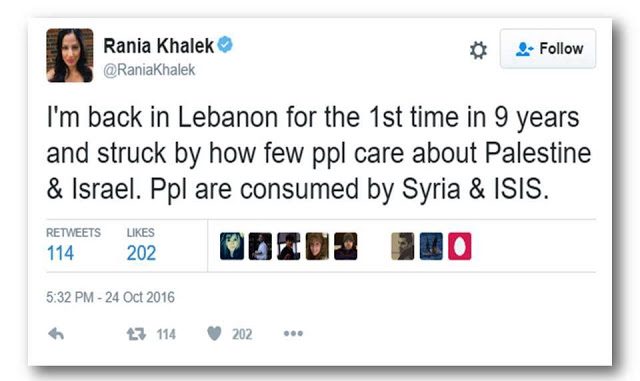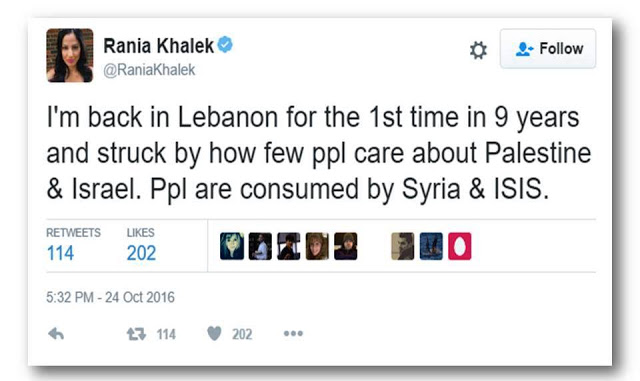
About a week ago, popular anti-Israel activist Rania Khalek arrived for a visit in her ancestral Lebanon and was immediately disappointed. As she announcedto her almost 100,000 Twitter followers: “I’m back in Lebanon for the 1st time in 9 years and struck by how few ppl care about Palestine & Israel. Ppl are consumed by Syria & ISIS.”
Given how freely she admitted that she was utterly clueless about what’s going on in the region to which she dedicates so much of her “journalistic” output, it’s perhaps useful to recall that Khalek told a fan last year in an interview: “I became a journalist by accident … I majored in exercise science and was working in cardiac rehabilitation and preparing to go to nursing school.” But then, some day in 2008, exercise science major Rania Khalek discovered by chance that the mainstream media kept all sorts of important news from her, and she promptly decided to do something about it; in particular, she soon began devoting herself to educating the world about the endless evils committed by Israel.
A noble mission, no doubt – but despite Khalek’s undeniable passion for her new calling, her ‘accidental’ journalism has begun to look more and more like a terrible train wreck. To be sure, none of Khalek’s fans were much disturbed by her openly displayed antisemitism, though there were a few raised eyebrows when she once tried to argue that a site promoting Holocaust denial also provided “completely factual” material about the unspeakable evils of Zionism. More recently, however, Khalek got caught in the backlashagainst her good friend Max Blumenthal, who alienated many of his fans when he tried to present the heroic Syrian rescuer group “White Helmets” as part of a sinister Western conspiracy against jolly good old Bashar Assad. In the ensuing controversy about the unsavory views of some prominent anti-Israel activists, it turned out that Khalek had been rightly accused of plagiarism. At about the same time, a piece she had written in late September for The Intercept – a publication co-founded by Israel-haterGlenn Greenwald – suddenly attracted sharp criticism; the articleon the supposed impact of sanctions against the Assad regime was even denouncedas “yellow journalism” and – somewhat belatedly, in my humble opinion – there were complaints about “Khalek’s demonstrable contempt for factual accuracy and [her] proven record of misleading readers.” I’ll admit that I’m tempted to say “I told you so”…
But Rania Khalek was far above such criticism, and soon after arriving in Lebanon, she confidently asked her fans to finance her trip to the region on which she had “reported” for years without having visited for almost a decade. As she writes in her fundraising appeal: “I wanted to go to the region first hand to get a real sense of what’s happening.” Initially, she wanted$ 12,000 for a month; in the meantime, she has become a bit more modest and is now asking for only $8000 (she has received pledges for almost $2800). Interestingly, she lists among the services she has to fund “translators,” which presumably means that even though her parents are Lebanese and she sometimes complainsabout experiencing discrimination as an Arab and Muslim, she doesn’t know Arabic.
Shortly after Khalek started her fundraising campaign, it became clearwhat had finally brought her to the Middle East: it was quite obviously not just the urge “to go to the region first hand,” but rather a “conference” organized by none other than Bashar al-Assad’s father-in-law. As the Guardian put it, “critics” were denouncing this conference as “little more than a Syrian regime propaganda exercise.” The announcementfor the invitation-only event described it as a “workshop” under the rather cynical title “State of Play in Syria.” The program featuredseveral “sanctioned war criminals” and, astonishingly, Khalek was listed as co-chair and presenter for a session on the effects of Western sanctions, where she perhaps planned to recycle her discredited Intercept article.
When she was faced with a fast and furious backlash on Twitter, Khalek decided to dig herself in a little bit deeper: she postedan utterly insincere statement, claiming she was just visiting Syria “with other international journalists” and that the conference would also be attended by “reporters from major international outlets” such as the New York Timesand the Washington Post – that is to say: media outlets for which Khalek had always expressed nothing but contempt were suddenly useful for providing her some cover. She also claimed that she had thought she would participate in the conference under “Chatham House rules” – i.e. the identity of speakers and participants would remain confidential – which amounts to admitting that she had hoped it wouldn’t come out that she had agreed to co-chair a session and also serve as a speaker.
She was bitterly mocked in response, with some people including graphic images of the victims of Assad’s atrocities. Soon the criticism also extended to Ali Abunimah’s Electronic Intifada, where she was not only a regular contributor but also an editor. Apparently, Abunimah was more interested in saving his own skin than in defending Khalek, and she eventually announcedwith considerable bitterness: “The outrageous attacks against me have expanded to @intifada. So I’m stepping down as an editor. The professional smear artists won.”
That turned out to be too little too late, as e.g. reflected in the disappointed musings of one fairly prominent (former) Intifada fan who lamented: “After years of fine journalism, the obtuse and abrasive nature of @intifada’s senior figures has caught up with them.” “Recent conduct of @intifada figures is a lesson for how you can build a strong activism brand, then destroy it in a few disastrous weeks.” “For years they used Palestine as a fig leaf; as an ‘instantly gain moral high ground’ card.” “I don’t know which is more sad. That @intifada shot itself in the foot, or that its leading figures were revealed for what they are.”
I will admit that I can see no reason for sadness – in fact, I think it’s great that leading anti-Israel activists have been “revealed for what they are.”
But Rania Khalek seems to be quite desperate now: she has posted yet another statement “[in] response to the ongoing deluge of questions, innuendo and attacks,” where she even admits that it was “a careless mistake” not to pay “close attention to the details of the workshop” – which she now claims not to have attended. That sounds like an admission that her critics were right, doesn’t it? It also sounds like an admission that her previous statement defending her participation in the workshop “under Chatham House rules” was just so much BS…
In the end, it has come to this: I find myself completely agreeing with a (now former) Intifada colleagueof Rania Khalek: “If a journalist can’t figure out the nature of a conference she’s speaking at, she’s been discredited as a reliable judge of info + sources.”
And yes, this obviously means that Khalek didn’t resign from Abunimah’s Intifada, but that she was fired: “EI fires Rania Khalek. her now ex EI colleagues disavow her to try to preserve whatever appearances are left.”
Abunimah himself has taken a vacation from Twitter – perhaps he needs some time to figure out how best to preserve whatever appearances are left?
We have lots of ideas, but we need more resources to be even more effective. Please donate today to help get the message out and to help defend Israel.


Leave a Reply